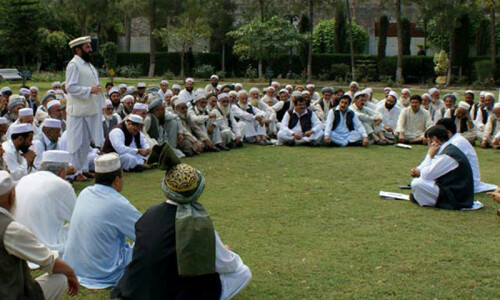OPPOSING lockdowns strongly, Imran Khan argues that hunger would kill more Pakistanis than Covid-19. States that have curbed the virus via lockdowns allowed essential activities only and the virus curve fell in eight to 10 weeks. Would such a lockdown kill more Pakistanis from hunger than Covid-19?
An Imperial College study says lockdown would save 200,000 to 300,000 Pakistani lives. A Yale study says lockdowns will save 182,000. Even this lower toll surpasses the combined deaths from our three recent mega crises: terrorism, 2005 quake and 2010 floods. The virus death estimates sans lockdown are clear, credible and huge. But no clear or credible estimate is available for the deaths lockdowns may cause due to hunger or other diseases in Pakistan.
With hard numbers missing, the best source is the opinions of medical bodies, food security experts, and UN and other aid agencies. Some agencies even maintain national disaster early warning systems (DEWS) for hunger and other threats. Medical bodies oppose relaxation. None of the experts/bodies, let alone a majority, has alerted that hunger is widespread or will kill more people than Covid-19. The dissenting voice comes from the head of the National Disaster Management Authority. Some have said this is a personal opinion being expressed by the head of an expert agency with a strong DEWS and technical staff. This reflects the perils of the increased trend under the PTI to give civilian posts to khakis. Clearly, the spectre of hunger deaths stems from politics and not technical analysis.
It’s hard to see thousands dying due to famine in present-day Pakistan, which has never had one. Big famine now occurs in major conflict zones like Yemen and Somalia where conflict disrupts work, markets, traditional famine-coping mechanisms and aid. Dealing with hunger in conflict-free zones is easy and common for humans. But we have limited capacity for the complex task of dealing with the unknown traits of Covid-19.
Easing the lockdown before the virus curve falls is risky.
In such novel matters, caution works best. So far, no hunger deaths or even starvation has been reported in Pakistan. But the lockdown has increased poverty. State, aid agencies and media have developed adequate monitoring capacities in earlier eras. So it should be easy to track and help families at risk among the 26 per cent (55 million) Pakistanis who are moderately or severely food-insecure with cash and essential health services.
The BISP/Ehsaas relief scheme has spent Rs91 billion to give Rs12,000 each to 7.5m families (around 50m persons). Only Rs36bn of it is new money. A country with a budget of over Rs7 trillion can surely give one or two more rounds of such aid over two to three months of lockdown even in these hard times by taxing the rich, borrowing and using aid.
Then there is private charity. We are among the biggest cheats on taxes globally but are generous charity givers. This nation of generous cheats would swing into more action if media found widespread starvation.
Our leaders think we have escaped the worst compared with the US and Europe, due to unproven factors like our climate, sturdy DNAs, divine favour bestowed on a chosen nation, etc. But this is still premature to say. The US now has 80,000-plus deaths. But when it had 42,000 confirmed cases, as we did until the other day (they have increased since) have now, it had only 522 deaths compared to our nearly 900. It reached 42,000 cases two months after its first known case; we did so after 2.75 months. Our cases are increasing more slowly, but until our curve falls sharply there is no guarantee it won’t increase faster soon.
We have more confirmed cases and deaths per million than neighbours like India, Sri Lanka and Bangladesh. These states had stricter lockdowns despite the similar socioeconomic issues.
Brazil’s case is very relevant too, as it has similar population size, climate, disease patterns, socioeconomic issues and loose lockdown patterns. It has 15,000-plus virus deaths. Brazil is over 70pc urbanised; we are around 40pc or so. The virus spreads faster in denser urban areas. Thus it may spread to our rural areas more slowly. But once it does so, it would take much longer to curb it. Thus, easing the lockdown before the virus curve fell and then poor enforcement is risky strategy, driven by Imran Khan’s unscientific, pre-modern worldviews and concerns of almighty forces about their sacred budget.
One hopes the PTI changes course or else its risky gamble pays off. Since we have had partial lockdowns, the death toll may not reach the levels given by Imperial College or Yale studies. But even several thousand deaths will surpass those from a major disaster like the 2010 floods and will reflect poorly on the PTI’s ability and desire to protect people.
The writer is a fellow at UC Berkeley and heads INSPIRING Pakistan, a progressive policy unit.
Twitter: @NiazMurtaza2
Published in Dawn, May 19th, 2020











































